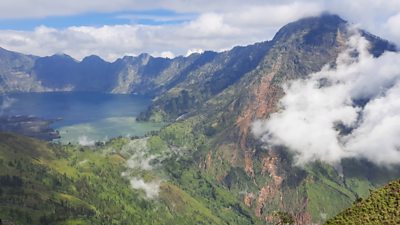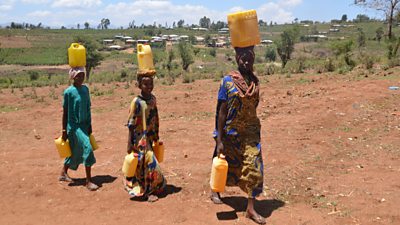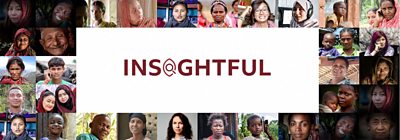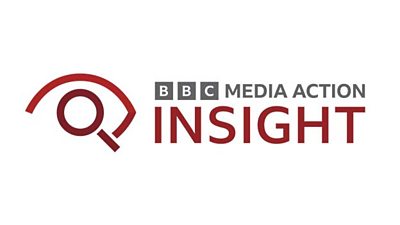27 February - 2 March 2023
To achieve development and social justice, and ensure no one is left behind, we need to understand the complexities of people’s lives. Research to build this understanding is more critical than ever, especially in diverse and disordered information landscapes where knowledge, norms and behaviours are shifting fast.
Our INSIGHTFUL webinars, run by ���˿��� Media Action research teams across the world, explored:
- How is research shaped by behavioural insights, digital developments and deep understanding of context?
- What research is most helpful in understanding how to engage people and accelerate positive change?
- How can research be used to support the design of impactful programmes?
Missed our global webinars? Watch them again below:
Leaving no one behind: Understanding audiences for effective programming
This online panel event featured speakers from across ���˿��� Media Action in Africa, sharing insights on using research to understand diverse audiences to inform the development of audience-centred media and communication strategies.
Speakers from Tanzania, Nigeria, Sierra Leone and South Sudan discussed projects focused on inclusivity - including young girls who have been marginalised and people living with disabilities - in these settings.
Date: Tuesday 28 February 2023
Time: 9-10:30 GMT (10-11:30 WAT; 11-12:30 CAT; 12-13:30 EAT)
Moderator: Emebet Wuhib-Mutungi, Senior Health Advisor, ���˿��� Media Action
Speakers:
Anu Njamah, Head of Research and Learning, Nigeria
Mohamed Kpaka, Research Officer, Sierra Leone
Jasmine Shio, Research Manager, Tanzania
Wani Moses, Senior Research Officer, South Sudan
The art of understanding: Effective communication with audiences in conflict and crisis
How do we do research in conflict and crisis affected settings? And why is it so important?
Our online panel discussion facilitated by Rachel Maher, UNOCHA’s AAP Advisor on Accountability to Affected Populations, explored how audience insights from ���˿��� Media Action research teams in Afghanistan, Bangladesh, Kenya, and Somalia help shape effective media programming, and help humanitarian partners communicate better with people they are trying to serve.
Date: Wednesday 1st March
Time: 9-10:30 GMT (12-13:30 EAT; 13:30-15:00 AFT; 15-16:30 BST)
Moderator: Rachel Maher, Advisor on Accountability to Affected Populations, UNOCHA
Panellists:
Mahdi Zaki, Research Manager, Afghanistan
Mahmuda Hoque, Research Manager, Bangladesh
Caroline Mwende, Research Officer, Kenya
Hodan Ibrahim, Senior Research Officer, Somalia
Elevating public interest media: The power of understanding our audience
In challenging times, how can audience research be used to support media organisations?
This session explored the shifting media ecosystems and geographies that public interest media organisations must negotiate. We examined the opportunities and difficulties that are fast emerging for these businesses, discovered how crucial audience research can be to drive strategy, and shared how flexible approaches to audience research can help resilience by hearing from partners on their experiences.
The webinar included examples of research used in Ethiopia, Ukraine, Zambia, Myanmar and Solomon Islands.
Date: Wednesday 1st March
Time: 11-12:30 GMT (13-14:30 CAT)
Moderators: Nick Chasimpha, Research Manager, ���˿��� Media Action Zambia and Tania Nikitina, Senior Research Manager, ���˿��� Media Action Eastern Europe and Central Asia
Panellists:
From ���˿��� Media Action:
Suzanne Devai, Senior research manager
Anna Godfrey, Head of evidence
Yin Min Htun, Research manager, Myanmar
Kengah James, Research manager, Africa
From Suspilne - Ukraine's public broadcaster
Victoria Borshchenko, Head of Suspilne Research Centre
Yevheniia Siriak, Research manager
Andriy Taranov, Board member
From Zambia:
Angela Mtambo, Programmes officer and community journalist, Luswepo Community Radio Station
DigiTalk: Segmenting and measuring digital audiences
This webinar covered the latest digital trends from South and South East Asia, and explored how at ���˿��� Media Action we have understood our social media audiences and evaluated our digital work. The presentation was followed by a panel discussion with experts from the sector, sharing their experience of working in the digital space.
The webinar included case studies from Cambodia, India, Indonesia, and Myanmar.
Date: Thursday 2nd March
Time: 8:30-10 GMT (14.00–15:30 IST; 15:30–17:00 ICT)
Moderator: Varinder Gambhir, Director of Research, ���˿��� Media Action India
Panellists:
Dawn Herdman, Founder & CEO, Illuminate Asia
Shachi Lapasia, Business Lead, Yuvaa
Paurush Sharma, Digital Communication Consultant
Sao Vichheka, Research Manager, ���˿��� Media Action Cambodia
Neema Gupta, Research Manager, ���˿��� Media Action India
Rosiana Eko, Research Manager, ���˿��� Media Action Indonesia
Yan Htaik Seng, Country Director, ���˿��� Media Action Myanmar
Khin Nilar Ko, Research Manager, ���˿��� Media Action Myanmar
Our INSIGHTFUL research
-

Seven lessons learned from mHealth in India
What we learned from developing and scaling mobile health (mHealth) solutions,to address child mortality and improve maternal health in India. -

Learning from Myanmar - Ma Shet Ne (Don't Be Shy)
Working under difficult conditions in Myanmar, our research team has informed a creative digital project on sexual and reproductive health. -

Learning from Malasur - the Demon of Defeca
How research shaped a major campaign tackling the health threats from poor septic tank management. -

Climate change: New evidence on how media can engage youth to take action
This multi-method evaluation adds to existing evidence by showing how branded media content in Indonesia has been effective in increasing young Indonesian’s knowledge, their motivation and confidence to engage, take individual actions and discuss issues around deforestation and climate change. -

A Common Service for Rohingya people in Bangladesh
Our ongoing research with audiences has been helping humanitarian agencies communicate more effectively and be more accountable to the Rohingya refugees and communities living in and around Cox’s Bazar since 2017. -

Lifeline - a radio show challenging norms around FGM in Somalia
Our qualitative research informed the development of Tusmada Nolosha (Lifeline) - with influencers, mothers and fathers giving feedback on how they felt it had addressed the topic of FGM. Read our research summary. -

Reflections on disability-inclusive research in Nigeria
We know that people with disabilities face multiple exclusions and discrimination – we are determined that our research will not be among them. Our Head of Research and Learning in Abuja shares our learning and reflections. -

Using compassion to build tolerance through radio drama in Myanmar
Our senior governance and rights advisor examines the role of research and insight in addressing sensitive social and ethnic divisions in our radio drama in Myanmar. -

What role can communication play in supporting young Ethiopians to succeed in employment?
These five research briefings sought to better understand young people in Ethiopia, by assessing their information needs, the networks that impact their decisions and community roles, and the role of media and communication in supporting them to realise their aspirations and lead healthy, active lives. -

Designing for inclusion: From invisible to #Invaluables
We used research. insight and audience segmentation to drive impact for our project supporting the rights of informal waste-pickers in Bengaluru, India. -

The power of research: our work with WHO during the pandemic in Africa
Audiences are at the heart of our work - and reaching them effectively at scale was never as critical as at the height of the global pandemic. Find out how we designed methodology and research tools for the WHO. -

Helping media partners better understand and engage their audiences
This summary looks at findings from ongoing research under our PRIMED media development project, which helps media partners build a picture of audience profiles and needs to equip them with insight to improve output.



